The European Union’s Digital Markets Act (DMA) is quickly reshaping the landscape of tech regulation, and Apple’s iPadOS is now under intense scrutiny. The EU has launched a review of the operating system to determine whether it meets the requirements set by this landmark legislation. Apple’s response so far has been to release a compliance report outlining the necessary changes, but experts are concerned that the company may face significant challenges in meeting the DMA’s stringent rules.

1. Allowing Users to Choose Their Default Browser
One of the DMA’s primary goals is to increase user choice and reduce the control exerted by tech giants like Apple. As part of this effort, the EU is demanding that Apple permit users to set a default browser other than Safari. This is a critical component of the law, aiming to break Apple’s browser monopoly on its devices. If Apple fails to comply, it could face hefty fines of up to 10% of its global revenue—a penalty significant enough to send a message to other tech giants about the seriousness of these regulations.
However, compliance could prove difficult for Apple, which has long prioritized its own ecosystem. The challenge lies not just in offering a choice of browser but in ensuring that alternative browsers function as seamlessly as Safari—especially given the performance and integration advantages Apple’s own software enjoys.
2. Permitting Alternative App Stores
Another major requirement under the DMA is that Apple allow alternative app stores to be installed on iPads. This shift aims to reduce the company’s monopolistic hold over its App Store, which currently restricts developers to a single marketplace with hefty commissions. The introduction of alternative app stores promises to foster competition, potentially giving users more options for apps and developers a better share of the revenue.

While this change is expected to benefit consumers and developers alike, it also raises security concerns. Experts warn that allowing third-party stores opens the door to potential security risks, as these stores may not enforce the same strict vetting processes as Apple’s App Store. The proliferation of malware, phishing scams, and fraudulent apps is a real threat, particularly if Apple cannot fully oversee the content distributed through these new channels.
To address these risks, Apple is likely to implement additional security protocols, such as notarization requirements for apps and permission layers for users. However, whether these measures will be sufficient to maintain the security of iPadOS remains to be seen.
3. Enabling Third-Party Access to iPadOS Features
The third significant change demanded by the EU concerns third-party accessories, like headphones and smart pens. Under the DMA, Apple must ensure that these non-Apple devices can fully access iPadOS features, something that has traditionally been restricted by the company. This requirement is in line with the EU’s goal of promoting fair competition and reducing the barriers that lock users into Apple’s ecosystem.
The challenge here is technical: Apple will need to ensure that third-party accessories can interact with iPadOS as seamlessly as Apple’s own products. If not, users may find themselves frustrated with compatibility issues, undermining the very competition the law seeks to foster. The increased complexity of managing these interactions could also impact the user experience, which Apple has long prided itself on maintaining at the highest standards.
A Balancing Act for Apple
Apple’s compliance with the DMA is a high-stakes affair. The company’s leadership has long emphasized user privacy and security, but the DMA rules could force the company to compromise on these principles to some extent, especially in the case of third-party app stores. While Apple has committed to making the necessary changes, it remains to be seen whether it can strike the right balance between complying with the EU’s regulations and maintaining its own standards of security and quality.
The European Commission’s review of Apple’s compliance report is just the beginning. If the commission deems Apple’s efforts insufficient, the company could face major penalties. Moreover, the broader implications of the DMA—on both the European tech ecosystem and global tech regulation—cannot be overstated. As Professor William E. Kovacic, a law expert, noted, “The Digital Markets Act represents a critical step towards addressing issues related to dominance and abuse of market position”.
With the future of iPadOS—and the broader tech landscape—on the line, Apple is entering a new era of regulatory scrutiny, one that could set the stage for further regulatory moves worldwide. The coming months will be crucial in determining whether the company can meet these new demands or face the consequences of non-compliance.

















